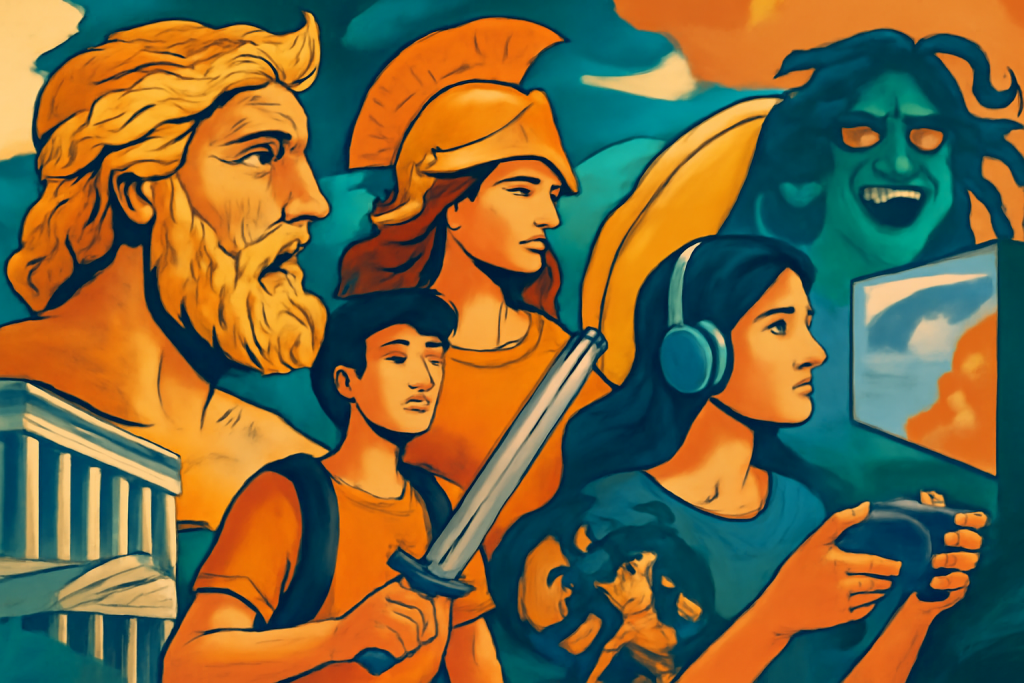Greek mythology has greatly influenced modern culture. Its impact is seen in everything from language and literature to films and video games. Ancient stories full of gods, heroes, and mythical creatures still captivate audiences today. So, why does Greek mythology remain relevant? Let’s explore how these timeless myths shape our modern culture.

Greek Mythology: The Foundation of Ancient Culture
Greek mythology originated in ancient Greece. These myths explained natural events and conveyed moral lessons. The gods represented forces of nature, emotions, and ideals. For example, Zeus ruled the gods, and Athena embodied wisdom. These stories were shared orally before being written down in texts like Homer’s Iliad and Odyssey.
Over time, these myths became essential to Greek life. They not only entertained but educated people about the world around them.
Mythological Archetypes in Modern Culture
Many elements of Greek mythology are still present in today’s culture. Characters, themes, and morals from these ancient stories remain influential. Here’s why:
- Hero’s Journey: The “hero’s journey” structure from Greek mythology still shapes modern stories. This narrative involves an ordinary character on an extraordinary quest. It appears in films like Star Wars and The Lord of the Rings. Characters like Luke Skywalker and Frodo Baggins follow this familiar journey.
- Gods and Superheroes: The gods of Greek mythology were powerful yet flawed. Today, superheroes embody this duality. Characters like Thor and Wonder Woman are inspired by these ancient gods, balancing human vulnerability with god-like strength.
- Moral Lessons: Greek myths taught valuable lessons about hubris, fate, loyalty, and love. Modern stories continue to explore these themes. For instance, the myth of Icarus warns against reckless ambition, a lesson found in stories like The Great Gatsby and Breaking Bad.
Greek Mythology in Movies and TV
Movies and TV shows have revived Greek mythology, making it accessible to new generations. Here are some examples:
- Percy Jackson: Rick Riordan’s Percy Jackson & the Olympians series brought Greek mythology to life for young audiences. It reimagines the gods in the modern world, showing that they still exist today.
- Clash of the Titans and Immortals: Films like Clash of the Titans (2010) and Immortals (2011) offer action-packed retellings of Greek myths. These movies bring characters like Perseus and Theseus to the screen, offering an exciting spectacle while staying true to the original stories.
- Wonder Woman: The 2017 Wonder Woman film draws from Greek mythology. The title character, a daughter of Zeus, exemplifies the blend of mythology and modern-day storytelling. This movie proves that ancient myths still have a place in today’s pop culture.
Greek Mythology in Literature and Video Games
Greek mythology continues to influence literature and video games. Its timeless themes of love, revenge, and transformation resonate with modern creators.
- Neil Gaiman’s Norse Mythology: Gaiman’s retelling of Norse myths shows how ancient stories can be modernized. Similar retellings of Greek myths, like Madeline Miller’s Circe and The Song of Achilles, offer fresh perspectives on familiar characters.
- Video Games: Video games have embraced Greek mythology. God of War follows Kratos, a mortal entangled in the affairs of the gods. Assassin’s Creed Odyssey also lets players explore ancient Greece, engaging with its mythology firsthand. These games allow players to interact with the gods, heroes, and legendary creatures of ancient Greece.
Why Greek Mythology Still Matters Today
Greek mythology and modern culture remains relevant for several reasons:
- Timeless Themes: Greek myths address universal issues like love, fate, and human nature. These themes are still relevant today.
- Relatable Characters: The gods of Greek mythology are both divine and human. They show traits that are easy to relate to, such as ambition, jealousy, and love. These complex characters continue to appear in modern stories.
- Enduring Popularity: Greek myths continue to evolve. Through adaptations in movies, literature, and video games, they stay fresh and engaging for new audiences.
Conclusion
Greek mythology is far from outdated. It has adapted to modern culture, influencing everything from entertainment to language. The gods and heroes of Greek mythology continue to inspire films, books, and games. The themes of love, ambition, and transformation are as relevant today as they were thousands of years ago. As a result, Greek mythology will remain a key part of our cultural fabric, inspiring stories for generations to come.
References:
- Gaiman, N. (2017). Norse Mythology. New York: W.W. Norton & Company.
- Miller, M. (2018). Circe. New York: Little, Brown and Company.
- Riordan, R. (2005). Percy Jackson & the Olympians: The Lightning Thief. New York: Hyperion Books.









